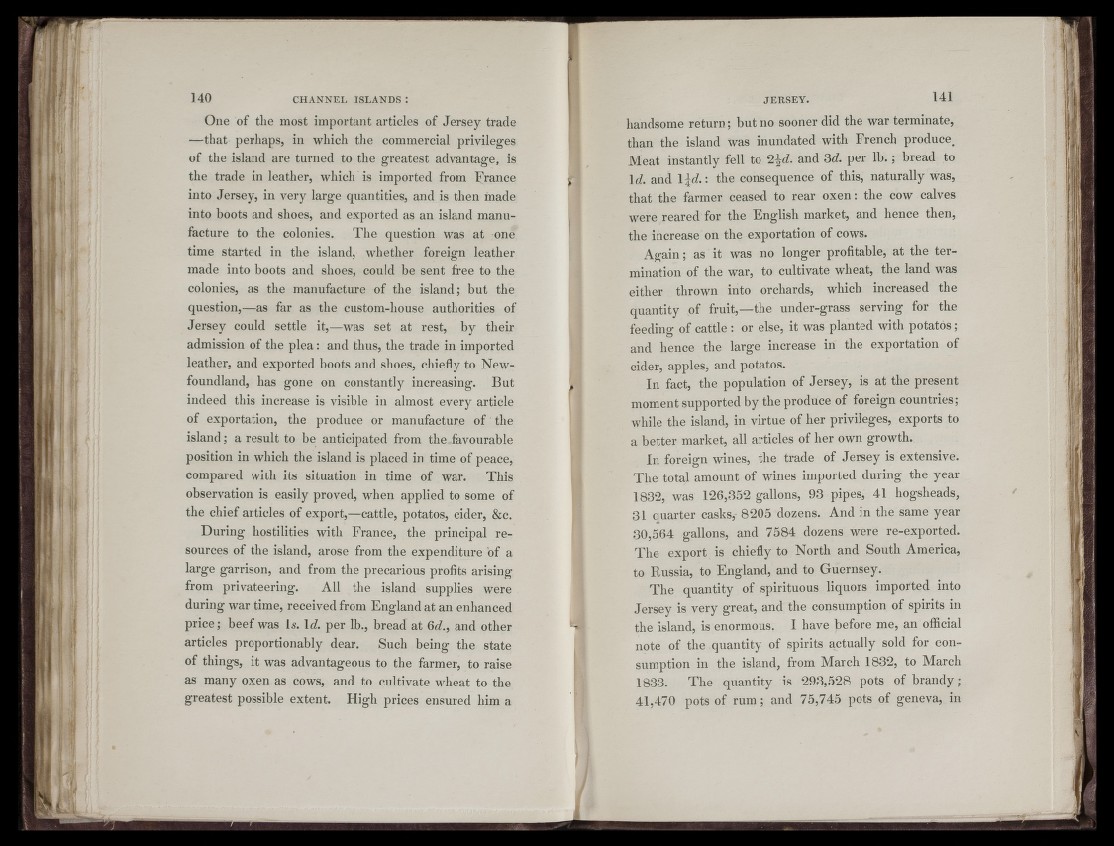
m:.
Mi i : f R
One of tlie most important articles of Jersey trade
—that perhaps, in which tlie commercial privileges
of the island are turned to the greatest advantage, is
the trade in leather, which is imported from France
into Jersey, in very large quantities, and is then made
into boots and shoes, and exported as an island manufacture
to the colonies. The question was at one
time started in the island, whether foreign leather
made into boots and shoes, could be sent free to the
colonies, as the manufacture of the island; but the
question,—as far as the custom-house authorities of
Jersey could settle it,—was set at rest, by their
admission of the plea: and thus, the trade in imported
leather, and exported boots and shoes, chiefly to Newfoundland,
has gone on constantly increasing. But
indeed this increase is visible in almost every article
of exportation, the produce or manufacture of the
island; a result to be anticipated from the favourable
position in whicli the island is placed in time of peace,
compared with its situation in time of war. This
observation is easily proved, when applied to some of
the chief articles of export,—cattle, potatos, cider, &cc.
During hostilities with France, the principal resources
of the island, arose from the expenditure of a
large garrison, and from the precarious profits arising
from privateering. All the island supplies were
during war time, received from England at an enhanced
price; beef was I5. Id. per lb., bread at 6d., and other
articles proportionably dear. Such being the state
of things, it was advantageous to the farmer, to raise
as many oxen as cows, and to cultivate wheat to the
greatest possible extent. High prices ensured him a
t i
handsome return; but no sooner did the war terminate,
than the island was inundated with French produce.
Meat instantly fell to 2^d. and Sd. per lb .; bread to
Id. and Qf/.: the consequence of this, naturally was,
that the farmer ceased to rear oxen: the cow calves
were reared for the English market, and hence then,
the increase on the exportation of cows.
Again; as it was no longer profitable, at the termination
of the war, to cultivate wheat, the land was
either thrown into orchards, which increased the
quantity of fruit,—the under-grass serving for the
feeding of cattle : or else, it was planted with potatos;
and hence the large increase in the exportation of
cider, apples, and potatos.
In fact, the population of Jersey, is at the present
moment supported by the produce of foreign countries;
while the island, in virtue of her privileges, exports to
a better market, all articles of her own growth.
In foreign wines, the trade of Jersey is extensive.
The total amount of wines imported during the year
1832, was 126,352 gallons, 93 pipes, 41 hogsheads,
31 quarter casks, 8205 dozens. And in the same year
30,564 gallons, and 7584 dozens were re-exported.
The export is chiefly to North and South America,
to Russia, to England, and to Guernsey.
The quantity of spirituous liquors imported into
Jersey is very great, and the consumption of spirits in
the island, is enormous. I have before me, an official
note of the quantity of spirits actually sold for consumption
in the island, from March 1832, to March
1833. The quantity is 293,528 pots of brandy;
41,470 pots of rum ; and 75,745 pots of geneva, in